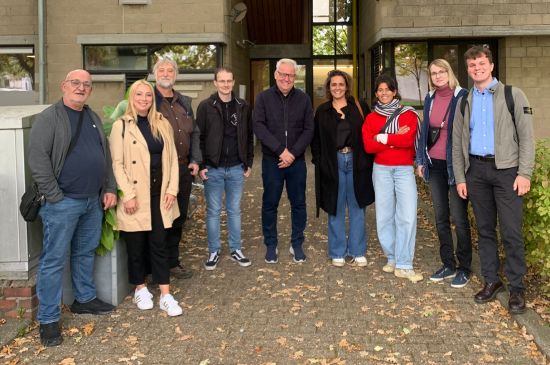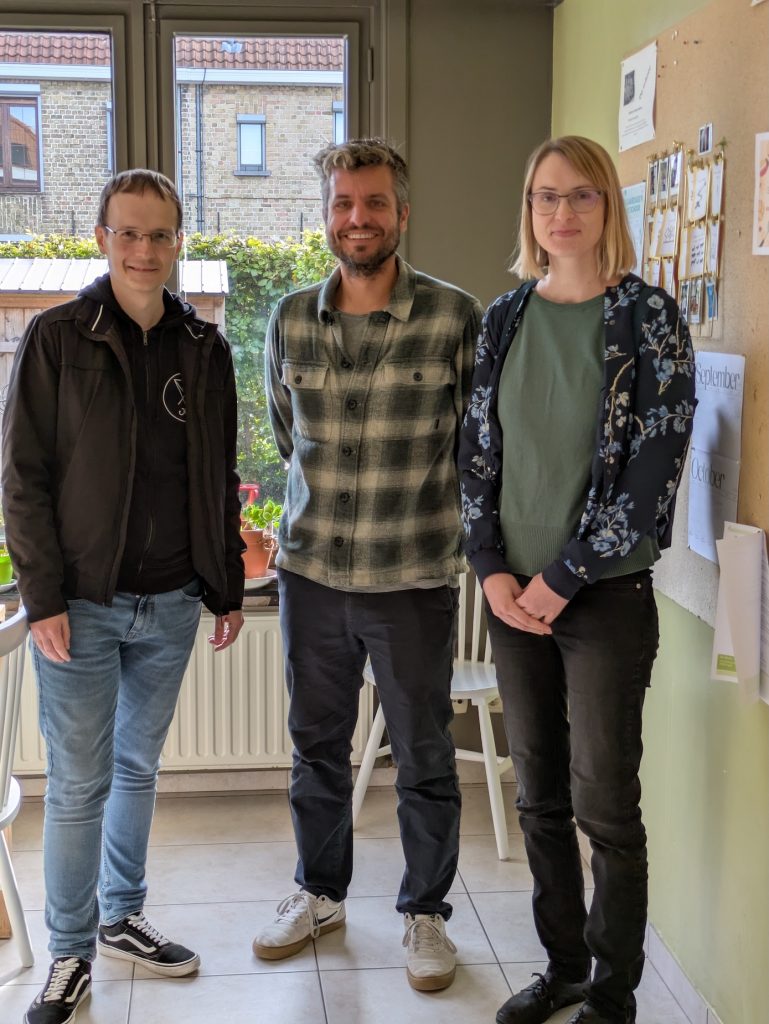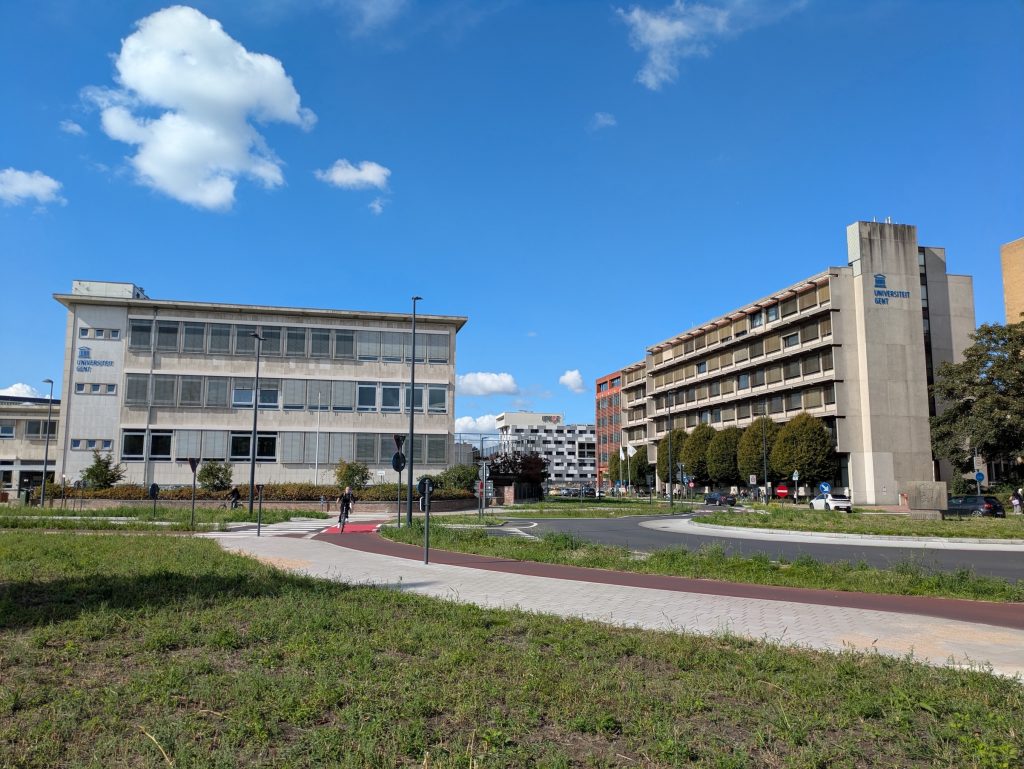Digital technology and data play an increasingly important role in social work today. We collect numbers, monitor indicators, create overviews and algorithms. This trend has its benefits, but also its limitations. Belgian professor Rudi Roose and his colleagues at Ghent University offer a counterbalance to this trend, which they refer to as dataism: relationshipism. According to this perspective, the quality of social work is based on trust, dialogue, and relationships rather than on measurable indicators. This approach guided us throughout our autumn study visit to Flanders funded by the DigiWell project.
De Patio in Bruges: social work under one roof
Our first stop was De Patio in Bruges. This service focuses on children and young people up to the age of 25 and their families. What makes it stand out is that it integrates services that are often fragmented – psychological, educational, and social assistance. Their aim is not efficiency, but rather to get as close as possible to everyday life: the service is located in terraced houses without visible signage so that it blends naturally into the community.
Listening and collaborative dialogue are key here – rules are not rigid, and the focus is on finding good enough solutions rather than ideals. The whole family and surrounding institutions (school, police, neighbours) also play an important role. Everything feels natural and friendly, and children can not only talk about their problems, but also get a hot meal and place to relax. Relationships, not rules, play the main role in this environment.
Community prison in Kortrijk: security through relationships
Another experience was a visit to the community prison in Kortrijk. Its location near the university rather than on the city outskirts suggests that it is a place more open to society. The architecture without bars, the emphasis on so-called dynamic security, and the partnership approach between staff and prisoners create an environment that strives to be as close to everyday life as possible.
The prisoners—referred to here as residents—cook for each other, clean, take care of animals, spend time together with the staff, but above all, they have the opportunity to engage in dialogue. They themselves say that here they are not just a number, but a person with a name and a story. The atmosphere resembles a community where people support each other. Here, too, a relational approach is evident: rehabilitation is not based on strict rules, but on trust and participation.
Encounters with inspiring practitioners: Delphine Levrouw and the social climate in child and adolescent services
We also met with many inspiring practitioners. One of them was Delphine, who worked for over 20 years as a social worker in residential facilities for children and adolescents and observed how care was gradually changing into a procedure due to neoliberalisation and the concept of new public management.
This process troubled her greatly, so she decided to examine it in her dissertation, in which she pointed to the deterioration of the social climate and relationships in residential care. She pointed out that social workers had become technical professionals who dealt with every situation using clearly set rules.
They create procedures and standards that distract us from relationships as the main tool of social work. She therefore proposed the concept of reflexive professionalism, within which social workers should take an interest in the stories, wishes, feelings, and desires of children and adolescents, treat them as partners, and foster a positive and supportive social climate through dialogue.
When social work is not afraid to be political
But social work cannot be based on dialogue alone. Because it takes place in a neoliberal context, it becomes part of a system that can be oppressive, and dialogue itself is no longer sufficient, as it often becomes a tool of this system. The neoliberalisation of social work seeks to depoliticise it by emphasising consensus, which ultimately serves the interests of the neoliberal system.
It is therefore important to understand social work not as apolitical and neutral assistance to individuals, but as an activity based on the values of social justice, anchored in civil society and having a significant social and structural dimension.
Bart Van Bouchaute and a course that challenges the status quo
We spoke with Bart, head of a postgraduate course at Ghent University, about awareness of this role of social work and the possibilities for its politicisation. The course arose precisely from the need to bring critical thinking and the ability to question the status quo back into social work. It is based on the Flemish tradition of civic activism in the 1990s, when society was permeated by community initiatives and discussions about social justice.
The course has three modules. In the first module, participants learn about critical theories that challenge the notion of social work as a purely individual activity. The second module focuses on applying these theories in practice. Participants analyse specific cases and reflect on how the interconnection between the micro, meso, and macro levels manifests in them. The third part is the most daring: it challenges depoliticisation and emphasises that it is not always possible to reach consensus; sometimes there is a need to acknowledge conflict and antagonism as a natural part of social reality.
Bart emphasised that the goal is not to turn social workers into activists, but to strengthen their awareness of a political dimension of their work. Politicisation thus translates into not revolution, but small everyday changes, for example in how we think about clients, rules, standardisation, our own professional discretion, or the system of which we are a part.
Jessica Toft: ethics as a space for resistance and hope
At Ghent University, we also had the opportunity to meet Jessica Toft, a professor from the University of Minnesota. In her lecture, she described how neoliberal pressure for efficiency and control is transforming the very essence of social work.
In her research, Jessica shows that while performance-oriented, quantification- and control-focused management logic brings apparent transparency, it dissolves the ethical core of social work. Under pressure from standardisation and bureaucratisation, social workers often find themselves in a paradox: the more they “follow” rules and procedures, the further they distance themselves from what is truly important in their work. Instead of dialogue, empathy, and accompaniment, social work becomes an administrative task.
Jessica emphasises that ethics is not an accessory, but an act of resistance against inhumane structures. Ethical reflection—the ability to perceive the context of a life situation—is, according to her, a form of macropolitical practice that challenges unjustly established systems. The politicisation of social work thus begins precisely in the ethics of everyday decision-making: in the willingness to say no when the system demands something that is contrary to humanity, and yes when there is a need to protect professional integrity and values.
The politicisation of social work is not a provocation, but it becomes an ethics of everyday courage. Social workers are not merely implementers of norms, but also their co-creators. Just as relationshipism brings attention back to people and relationships, Jessica reminds us that ethics itself is relational.
What we take away
Our trip to Ghent reminded us that social work is neither apolitical nor neutral. Every decision, every rule, and every silence has its impact. And the courage to talk about these things, to ask questions, and to challenge the status quo is more important today than ever before.
What we took away from our study visit to Belgium was mostly the confirmation that social work is based on relationships and the courage to protect them even amid changing social conditions. Students and social workers often look for clear methodologies and tools to help them deal with complex situations. However, these can never fully capture the depth of human stories or the context in which social work takes place.
Our experiences from the work trip show us that trust, openness, and community involvement can have a more beneficial impact than a perfect manual. At the same time, relationship work also has a political dimension—it touches on justice, equality, and dignity—values that transcend the individual stories of clients.
At a time when pressure for standardisation, measurability, and efficiency is growing in Czechia, relationshipism and the politicisation of social work can serve as an important reminder: neither relationships nor responsibility can be reduced to data. Social work remains a human, relational, and civically engaged profession. And that is precisely where its strength lies.


 6 min.
6 min. 




